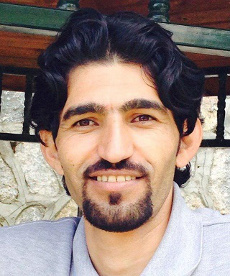Abdorrahman Boroumand Foundation on The Wall Street Journal
The Wall Street Journal
December 5, 2013, 8:30 AM IST
The Battle for Sistan-Baluchistan
By Umar Farooq
http://blogs.wsj.com/indiarealtime/2013/12/05/the-battle-for-sistan-baluchistan
Where Pakistan, Iran and Afghanistan meet, there’s a people that want their own independent homeland and groups claiming to represent them have fought a three-decade’s long insurgency to get it.
The two million Baluchis, who are Sunni Muslims living in Sistan-Baluchistan, one of the largest and poorest of Iran’s 31 provinces, say the region belongs to them and they want more autonomy from Tehran.
Iran regards the area as a top security priority because of Pakistan’s links to Iranian nemesis Saudi Arabia. The two rival Muslim nations have backed competing proxies across the Middle East.
Majority-Shiite Iran suspects Saudi Arabia of backing Sunni insurgents in the region in the fight for dominance over land and resources. Saudi Arabia has denied those accusations.
The insurgency – which has killed hundreds of Iranian soldiers, government officials, and Shiite civilians – erupted again at the end of October leaving 14 Iranian soldiers dead.
A lack of development and cultural repression in the area has fomented popular support for militancy, according to Baluchi activists.
“There has been development, but always for the use of the government, not for the actual needs of the people,” said Nasser Boladai of the Baluchistan People’s Party, a Sweden-based group of Iranian Baluchis advocating for Baluch autonomy.
Iran has cracked down on Baluch-language newspapers, and public schools throughout the country must teach only in Persian. Mr. Boladai says this means native Baluchi speakers fall behind their Persian speaking peers.
Baluchis in Sistan-Balucistan move between the three countries for work, the cross-border channels are also considered key smuggling routes for products including opium. With little economic progress and an unstable security situation, Mr. Boladai says, some Baluchis turn to smuggling drugs. Iran has more than two million drug addicts, and drug-related charges account for 74% of executions, the head of Iran’s Supreme Council for Human Rights was quoted as saying by the Agence France Presse news agency in 2011.
Baluchis, who are 2% of Iran’s population, have accounted for at least 20% of executions since 2006, according to figures gathered by the Abdorrahman Boroumand Foundation, a Washington D.C.-based group which tracks human rights abuses in Iran.
The actual numbers may be much higher says Roya Boroumand, head of the foundation, as it is becoming more difficult to track executions of Baluchis. Iranian authorities increasingly move Balochi prisoners outside the region, according to Ms. Boroumand.
Jaish ul-Adl, the group that admitted to carrying out the latest attack on Iranian border guards at the end of October, claims to be fighting persecution of the Sunni Baluch people in Iran.
A day after the Oct. 25 attack, provincial authorities in Iran executed 16 Baluchi men in the southeastern city of Zahedan. Describing them as “rebels linked to groups hostile to the regime,” provincial prosecutor Mohammad Marzieh was quoted as telling the part-state owned Fars news agency the executions were carried out “in response” to the border attack.
Human rights groups say the men had all been in custody before the attack – some for three years – and had no apparent connection to the raid on the border guards.
The bloody retaliations continued when on Nov. 6, when a top prosecutor in the province, Mousa Nouri, was gunned down in Zabol city. Jaish ul-Adl claimed responsibility for his death, saying it was in response to the executions. Iranian police have disputed the group’s involvement, saying they have arrested those who carried out the attack.
“[Iranian authorities] just take some people from prison – be they political prisoners or drug offenders – and kill them just because they are Baluch,” says Mr. Boladai, of the Baluchistan People’s Party.
In 2009, after a bombing at a Shiite mosque in Zahedan killed 25 people, Iran put 13 Baluchis in that city to death, saying they were linked to Jundullah, another Sunni insurgent group based in Pakistan that had claimed responsibility for the blasts.
Between 2005 and 2010, Jundullah said it carried out attacks that killed hundreds of civilians and security forces. In 2010, Iran executed its leader, Abolmalek Rigi.
Restrictions on journalists mean it is difficult to get a clear picture of what is going on in the region, says Ms. Boroumand of the Abdorrahman Boroumand Foundation. “Most of those being arrested [by Iran] are religious minorities, in areas that have drug trafficking issues and a history of armed struggle,” Ms. Boroumand said.
“So it’s very easy for the state to arrest someone and blame bombings or armed actions on them,” she added. According to Ms. Boroumand, some of those executed in October for the killings of the border guards were political prisoners.
Pakistan is battling its own Baluchi insurgency, and has been criticized by Iran for failing to crack down on militant camps in its territory. “Islamabad is not fulfilling its task regarding providing security in border areas,” Alaeddin Boroujerdi, an Iranian lawmaker, was quoted as telling the Fars news agency on Nov. 12.
In 2007, Iran began construction of a 10 foot-high, 700 kilometer-long wall along its border with Pakistan. This February, Iran and Pakistan signed a pact sharing responsibility for combating drug smugglers and militants operating across the border, and making it easier to extradite prisoners.
Pakistan, which is looking to Iran to help finance a major natural gas pipeline through Baluchistan, has tried to downplay the issue. “We have worked closely with Iran on securing the region, and will continue to do so,” Aizaz Ahmed Chaudhry, a spokesman for Pakistan’s Foreign Ministry, told The Wall Street Journal.
 My Interrogator Said: You Are An Ass, And Asses Do Not Merit Human Rights
My Interrogator Said: You Are An Ass, And Asses Do Not Merit Human Rights